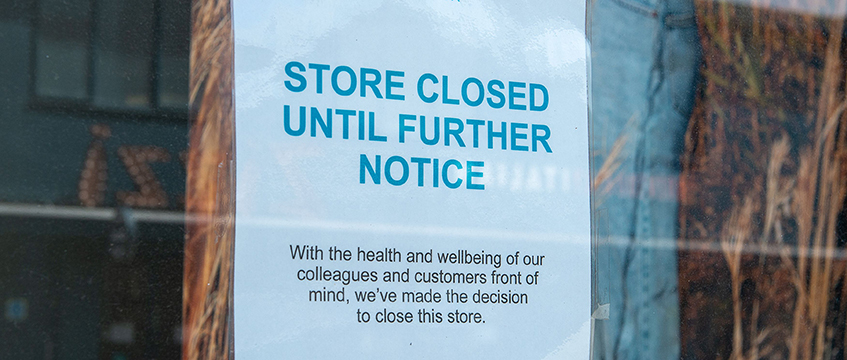Jonathan Seitler QC and Miriam Seitler debate moot points in property law – this time, rent liabilities during a pandemic.
Question: Do tenants still have to pay rent for property that won’t be able to be used for months in a normal manner?

No, says Jonathan Seitler QC, barrister at Wilberforce Chambers
Or, at least, not necessarily. There are three arguments that support the no answer.
1. The first is that the lease has become frustrated if and when circumstances have changed so radically that the tenant has simply not got what it bargained for – when it can say “this is just not the deal I did when I signed up to this lease”. Or, in Latin (it always sounds better in Latin) non haec in foedera veni – it was not this that I promised to do: see Davis Contractors Ltd v Fareham Urban District Council [1956] 1 AC 696 at 729 and Canary Wharf (BP4) T1 Ltd v European Medicines Agency [2019] EWHC 335 (Ch); [2019] EGLR 17 at [22] and [26(5)].
This is going to be a long shot – only really arguable when the lease is short and had a very specific purpose which the pandemic has totally and absolutely torpedoed and there are no other clauses in the lease (such as a rent cesser clause) which suggest how the risk of the unforeseen supervening event is to be distributed between landlord and tenant.
An example where this might work could therefore be a month long one-page lease of a stand or advertising hoarding at a conference or event which has been completely cancelled.
2. The second is to say there is an implied term in the lease that payments of rent are not required if and when the property is unusable, either in full or in part. This too is a long shot. There is no precedent for it under English Law, worth the name.
3. It’s the third argument, though, which has legs. It relates to the rent cesser clause. It arises where two conditions are satisfied.
The first (which is common) is that there is a rent cesser clause in the lease providing that the rent is to be suspended if the property “is damaged or destroyed by an Insured Risk as to make the Premises or any part of them unfit for occupation or use or inaccessible…” “Insured Risks” must then be defined in terms such as “fire, lightning, explosion… riot, civil commotion, malicious damage, storm, tempest, flood, earthquake, impact by any vehicle and such other risks as the Landlord may reasonably consider necessary to insure against”. This is also common. The last few words are the crucial ones.
The second condition is that the landlord must be insured against pandemic. A common extension to a landlord’s property insurance policy (common because it was cheap until February 2020) provides that: “The Insurer shall indemnify the Insured in respect of loss of Rent resulting from interruption of or interference with the Business during the Indemnity Period following … any human infectious or human contagious disease…an outbreak of which the local authority has stipulated shall be notified to them manifested by any person whilst in the Premises or within a 25-mile radius of it.”
In this situation, the rent cesser kicks in as long as the business has been interrupted (this being the tenant’s business, whether by closure due to the lockdown or by the severe damage to trade caused by the imposition of social distancing regulations in say, an office or retail premises) and this is “following” someone within 25 miles of the premises (in a local hospital?) having Covid-19, a notifiable human infectious or human contagious disease.
Now I know, Miriam, that the first thing you will say is that the pandemic does not leave the premises “damaged or destroyed”. It may leave the business damaged or the tenant’s finances damaged, but it does not leave the actual premises damaged. You would not be the first person to make this point.
Not so fast though. I have thought of that. You see the last few words of the rent cesser clause – “such other risks as the Landlord may reasonably consider necessary to insure against”? Those words are requiring you to read in the terms of the policy to that definition of Insured Risks. And when you do that, in order to make sense of the pandemic damaging the premises, you just have to read it as meaning financial damage or damage to the value of the premises – which Covid-19 may well do. There is no other damage a pandemic could do. You have to give the word “damage” a wide meaning in order to give it any meaning.
So the rent cesser kicks in, neither the tenant nor any guarantor has to pay rent for the period indicated in the rent cesser clause and the insurer has to cough up.
The scope of insurance policies like this is going to be examined before the end of July in Financial Conduct Authority v Arch Insurance (UK) Ltd and others. Eight insurers – MS Amlin, Arch, Argenta, Ecclesiastical, Hiscox, QBE, Royal & Sun and Zurich – have signed a framework agreement to participate in the test case brought by the FCA. Updates on that litigation are at www.fca.org.uk/news/press-releases/update-fca-test-case-validity-business-interruption-claims.

Yes, says Miriam Seitler, barrister at Landmark Chambers
Of course they have to. I can dispose of your poxy (though long-winded) rent cesser argument, and the other two, in seven brisk points.
1. Pandemics do not damage buildings. The word used in the rent cesser clause is “premises”. That means buildings, Dad. No building has been damaged as a result of Covid-19. Yes, the tenant may have been damaged. Yes, the business of the tenant may have been damaged. Yes, the value of the premises may have been damaged. But the premises itself? That narrow word is chosen for a reason – only damage to the actual building is covered under the rent cesser clause, which is why the next words are “or destruction”. The thing the rent cesser clause is getting at is physical damage to the bricks and mortar and that damage alone.
2. In any event, you read the definition of “Insured Risks” ejusdem generis. This means that where you have a list of things – like you have a list of catastrophes in the definition of ‘Insured Risks’ and all the items in the list have some common characteristic which constitutes them a genus, the general words which follow them (“and such other risks…”) ought to be limited to things of that genus: see Melinda Holdings SA v Hellenic Mutual War Risks Association (Bermuda) Ltd [2011] EWHC 181 (Comm) at [46]. All the things in the list necessarily give rise to physical damage so the “other risks” must be limited to those which involve physical damage too.
3. The landlord’s reasonableness in insuring against a pandemic – which the tenant will likely pay the premiums for – has to be judged at the date of the insurance, when it may well have been so remote a necessity as to be unreasonable. Good luck arguing that a three-month pandemic-induced national lockdown was reasonably foreseeable this time last year. I owe this point to Jonathan Chew.
4. Covid-19 may be a notifiable disease by reason of the diktat of central government but it is not something which “the local authority has stipulated shall be notified to them”. Might I suggest you read the insurance policy carefully before you start getting excited about these kinds of arguments. I owe this point to Barry Shaw of Greenland UK.
5. Insurance against pandemics is in any event very rare. They are not common enough to warrant your argument. I owe this point to the reality.
6. The frustration argument is never going to work, not least because no court would make a decision with such enormous commercial consequences that departed so radically from existing precedent. Put crudely, possibly hurtfully, Dad, if you couldn’t win for the European Medicines Agency, which, as an EU quango simply had no place in a post-Brexit UK, despite the judge accepting that Brexit would have been wholly unforeseeable at the time that the lease was entered into, there really is no hope for anyone else. No one wants to get into an argument about which was less foreseeable – Brexit or Covid-19 – do they?
7. The implied term argument, as you admit yourself, has no legal precedent. That is legal-speak for the fact that you are just making it up. Now, how do you say that in Latin?
Who wins the argument?
Last time, Miriam was the clear winner, as 72% of readers agreed that the Coronavirus Act 2020 was not enough. But who will triumph this time?








